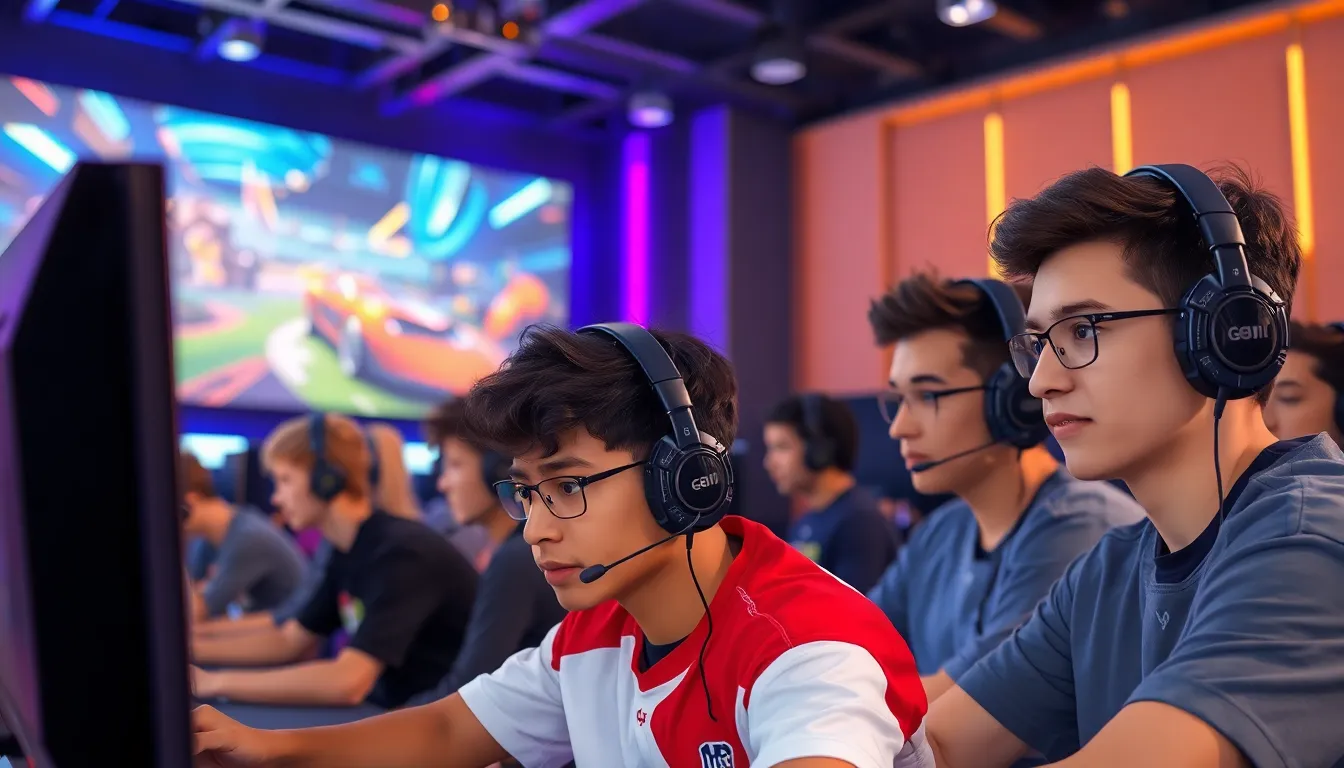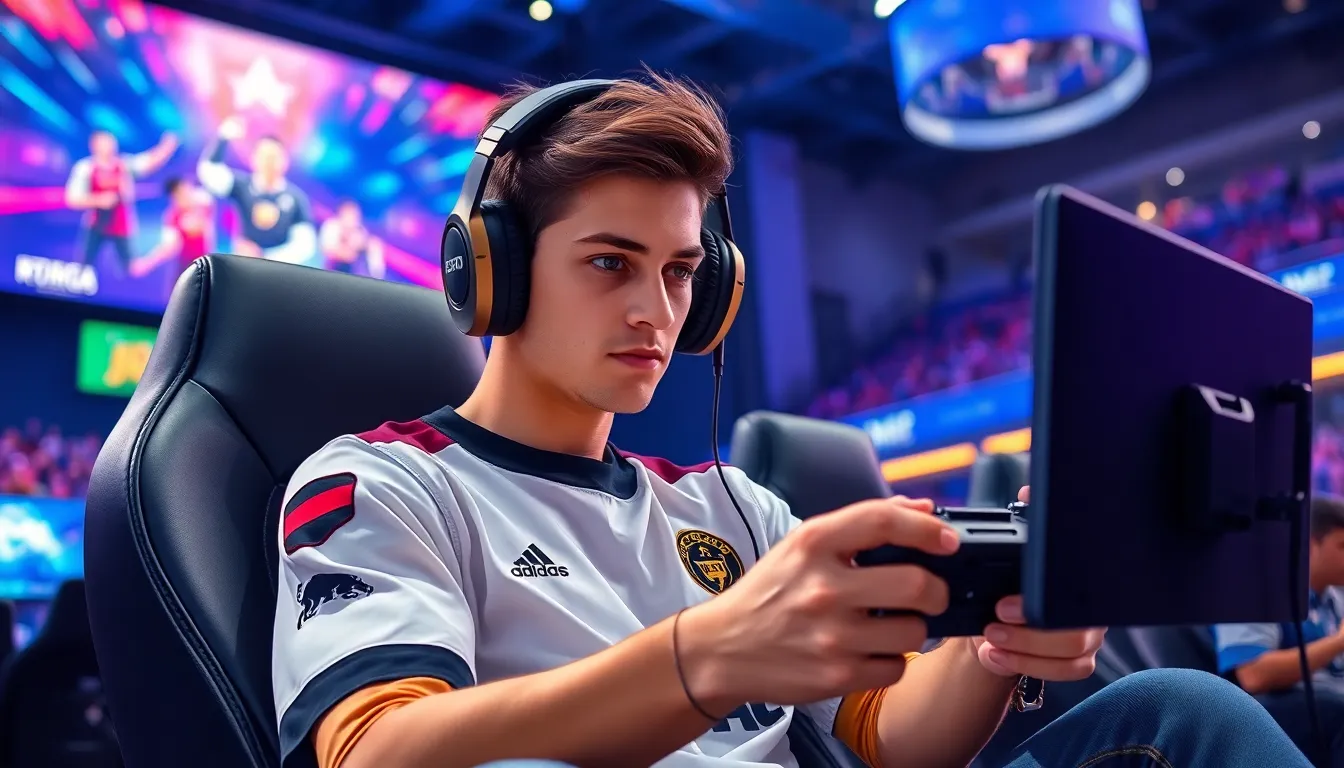In a world where athleticism often means sweat, muscles, and the occasional protein shake, a new contender has emerged: esports. Picture this: gamers sitting in their chairs, fingers dancing across keyboards, eyes glued to screens, all while competing for glory and hefty prize pools. But are these digital duels worthy of the same title as traditional sports?
As the debate rages on, fans and skeptics alike scramble to define what it truly means to be a sport. Is it the adrenaline rush of a last-minute victory or the strategic prowess required to outsmart opponents? With millions tuning in and even college scholarships on the line, it’s time to explore whether esports deserve a spot in the sports hall of fame—or at least a cozy corner on the couch with some snacks.
Are Esports Sports
Esports refers to organized, multiplayer video game competitions. Gamers compete individually or in teams for recognition and financial prizes.
Definition of Esports
Esports consists of competitive video gaming where players showcase their skills. Titles like “League of Legends” and “Dota 2” exemplify popular esports games. Spectators often watch tournaments online or in arenas, creating a vibrant community. This competitive landscape includes professional players, often signing contracts with teams, and entertaining millions of fans worldwide. Regulatory bodies establish rules, enhancing the event structure. Many industry professionals argue that esports embody the skills and strategies found in traditional sports.
Evolution of Competitive Gaming
Competitive gaming started in the early 1970s with simple arcade games. The rise of multiplayer online games in the 1990s marked a significant shift. Gamers organized local tournaments, enjoying friendly competition. By the early 2000s, online platforms enabled global competitions, attracting larger audiences. Events like the World Cyber Games and Electronic Sports World Cup helped legitimize competitive gaming. Recent developments include sponsorship deals and streaming platforms. Esports continues evolving, integrating mainstream media and gaining recognition as a legitimate form of competition.
The Debate: Are Esports Sports?

The classification of esports continues to spark discussion. Players exhibit skill and strategy, elements commonly associated with traditional sports.
Arguments Supporting Esports as Sports
Advocates highlight the competitive nature of esports. Gamers engage in intense mental and physical demands comparable to athletes. Esports tournaments draw large audiences, similar to traditional sports events. Significant prize pools incentivize players, promoting dedication and training. Many universities now offer scholarships, recognizing gaming as a viable skill. The growing support from sponsors further legitimizes esports as a competitive field. Communities form around esports, fostering teamwork and sportsmanship.
Counterarguments Against Esports as Sports
Critics argue that physical exertion distinguishes sports from esports. They emphasize the lack of traditional athletic movement in gaming. Concerns also arise about the health implications associated with prolonged gaming sessions. Some believe that competition based solely on mental skill lacks the physicality necessary for sports. Traditionalists often view esports as entertainment rather than competition. The absence of standardized rules and governing bodies further fuels skepticism regarding its classification as a sport.
The Physical vs. Mental Component
Esports incorporates both physical and mental elements, sparking discussion about its classification as a sport. While traditional sports rely heavily on physical exertion, esports presents unique challenges that demand a mix of both.
Physical Demands of Esports
Players engage in long hours of practice, often requiring exceptional hand-eye coordination. Maintaining posture is crucial, as poor ergonomics can lead to injuries. Additionally, reaction times significantly impact performance, necessitating quick reflexes to respond to dynamic environments. Participants often undergo fitness regimens to improve stamina, as prolonged gameplay can be physically taxing. Studies show that top esports athletes invest time in physical training, mirroring practices seen in traditional sports.
Mental Skills Required in Gaming
Strategic thinking plays a pivotal role in successful gameplay. Complex decision-making happens in seconds, impacting game outcomes. Players demonstrate strong problem-solving skills, adapting strategies in real-time to counter opponents. Moreover, teamwork remains essential, as effective communication drives successful collaboration within teams. Mental resilience significantly influences performance, especially during high-pressure tournaments. Together, these cognitive skills highlight the intensity of competitive gaming and its demand for sharp mental acuity.
The Role of Organizations and Tournaments
Organizations and tournaments play a pivotal role in the world of esports, shaping its structure and culture.
Major Esports Organizations
Numerous major organizations dominate the esports landscape. Teams like Team Liquid, FaZe Clan, and Cloud9 sign top players and invest in training facilities. Each organization fosters a unique brand identity, helping to attract sponsors and fans alike. They also create support systems that extend beyond gameplay, offering players mental health resources and career development. Furthermore, partnerships with game developers strengthen ties in the industry, enhancing competitive ecosystems.
Global Tournaments and Their Impact
Global tournaments showcase the epitome of esports competition. Events like The International, World Championship, and League of Legends World Championship draw millions of viewers worldwide. Such tournaments provide substantial prize pools, often exceeding millions of dollars. They stimulate local economies and encourage tourism as fans travel to watch their favorite teams. Streaming platforms amplify their reach, engaging a global audience and generating excitement within the gaming community. Each tournament contributes to the legitimacy of esports, encouraging recognition as a sport.
Traditional Sports
Esports has carved out a significant niche in the competitive landscape. Its blend of strategy skill and community engagement mirrors many aspects of traditional sports. As gaming continues to evolve it challenges conventional definitions of athleticism.
The debate surrounding esports classification is likely to persist as its popularity grows. With increasing recognition sponsorships and scholarships esports is becoming a legitimate avenue for competition. The unique demands of esports require players to hone both mental and physical skills further blurring the lines between gaming and traditional sports.
As the esports community flourishes it will undoubtedly shape the future of competitive entertainment. The ongoing dialogue about its status will continue to reflect society’s changing perceptions of what constitutes a sport.





